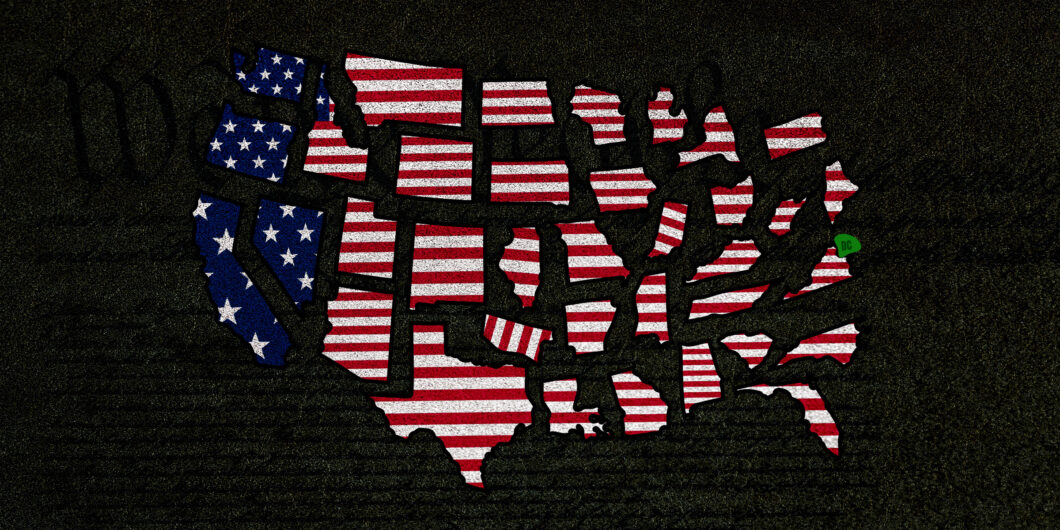America the Compact
I like Mark Pulliam, and I’ve enjoyed having him as a guest on the Tom Woods Show. But nobody’s perfect, and his lead forum essay on nullification is profoundly wrong.
The root of our disagreement goes back to the competing theories of the Union—the nationalist theory, whereby the United States is and always was a single, indivisible whole, with spokesmen like Daniel Webster and Joseph Story, and the compact theory of the Union as a collection of states with liberties of their own that preceded the Union, with proponents like Thomas Jefferson and Abel Upshur—that have defined American history.
As I lay out in my book, I have found no systematic rendition of the nationalist theory anywhere until the 1830s, but ample descriptions of the compact theory (historian Brion McClanahan rightly calls it the compact fact) throughout the 1790s.
Let’s start with what should be obvious: the states preceded the Union. The Declaration of Independence speaks not of a single blob but of “free and independent states” that “have full power to levy war, conclude peace, contract alliances, establish commerce, and to do all other acts and things which independent states may of right do.” The British likewise acknowledged the independence not of a single blob, but of a group of states, which they proceeded to list one by one.
Article II of the Articles of Confederation says the states “retain their sovereignty, freedom, and independence”; they must have enjoyed that sovereignty in the past in order for them to “retain” it in 1781 when the Articles were officially adopted. The ratification of the Constitution, in turn, was accomplished not by a single, national vote, but by the individual ratifications of the various states, each assembled in convention.
In the American system no government is sovereign, not the federal government and not the states. The peoples of the states are the sovereigns, and their ratification conventions are the expression of their highest sovereign voice. It is they who apportion powers between themselves, their state governments, and the federal government. In doing so, they are not impairing their sovereignty in any way. To the contrary, they are exercising it.
Emmerich de Vattel explained in The Law of Nations (1758) that in joining a confederation, states are not alienating their sovereignty, but remain perfectly sovereign: “Several sovereign and independent states may unite themselves together by a perpetual confederacy, without ceasing to be, each individually, a perfect state. They will together constitute a federal republic: their joint deliberations will not impair the sovereignty of each member, though they may, in certain respects, put some restraint on the exercise of it, in virtue of voluntary engagements.”
Since the peoples of the states are the sovereigns, then when the federal government exercises a power of dubious constitutionality on a matter of great importance, it is they who are the proper disputants, as they review whether their agent was intended to hold such a power. No one in any other context ever asks his agent whether the agent has or should have such and such power. In other words, the very nature of sovereignty, and of the American system itself, is such that the sovereigns must retain the power to restrain the agent they created.
It will not have been lost on the reader that nothing in this story describes the unbreakable, undifferentiated mass of individuals posited by the nationalist theory. We are dealing instead with a collection of societies, which is why the Constitution always refers to the United States in the plural.
Unfortunately, because the philosophical preconceptions of nearly all Americans are subconsciously Hobbesian, they recoil at these ideas, even though they are profoundly American. In a Hobbesian world there is a single, irresistible, and unbreakable power center, for without that there is chaos. This is how both left and right in America think today. Deeply embedded, preconceived ideas limit what it is possible to perceive. They hear the compact theory and all they can think is “treason!”
We cannot have a mere collection of states, according to this way of thinking, for there must be a “final authority” above them. That this argument leads directly to a world government (wouldn’t we need a “final authority” above the countries of the world, lest chaos reign?) either does not trouble them or does not occur to them.
The American Founding Fathers, on the other hand, were not Hobbesian, and created something very different from the consolidated nation that grew out of the French Revolution and that came to dominate the Western political landscape.
I fear Pulliam has also given us an incomplete rendering of the story of the Virginia and Kentucky Resolutions of 1798. Pulliam tells us, “No other states passed similar resolutions, many rejected them, and several even wrote resolutions opposing the right of states to declare federal statutes null and void.”
What Pulliam neglects to mention is that most of the states that openly rejected Virginia and Kentucky’s arguments did so less for the constitutional theory behind them than because these states supported the Alien and Sedition Acts themselves, and said so in their statements against Virginia and Kentucky. So we should be clear here: if we’re going to cheer those states, we are cheering support for censorship. Do we really crave sticking it to Virginia and Kentucky that badly?
Moreover, an even more important omission from Pulliam’s account is that not ten years later, the very states that had professed outrage at the blasphemy of Virginia and Kentucky themselves cited the Principles of ’98 in opposition to the policies of Thomas Jefferson. And they did so in language that would shock Pulliam’s delicate ears. They were not calling for mere protest against federal laws. They were calling for blocking their execution. The documents are right there in my book.
There are reasons to doubt that nullification would lead to the kind of chaos that Hobbesians expect. But even if it did, it would be a question of choosing your evil.
(I believe Pulliam’s take on the Nullification Crisis of 1832–33 is likewise wrongheaded. Clyde Wilson, professor of history at the University of South Carolina and editor of the Calhoun Papers, correctly observes that nullification worked exactly as it was intended: a compromise was reached that both sides could live with, and life went on.)
Pulliam dismisses my interpretation of the Supremacy Clause but nowhere explains why I am wrong. I’m afraid we dissidents are going to need more than his ex cathedra pronouncement on the matter. It would seem prima facie unlikely that the states would have ratified a Constitution with a Supremacy Clause that said, in effect, “This Constitution, and the Laws of the United States which shall be made in pursuance thereof, plus any old laws we may choose to pass, whether constitutional or not, shall be the supreme law of the land.”
Alexander Hamilton, at New York’s ratifying convention, said that while on the one hand “acts of the United States … will be absolutely obligatory as to all the proper objects and powers of the general government,” at the same time “the laws of Congress are restricted to a certain sphere, and when they depart from this sphere, they are no longer supreme or binding.” In Federalist #33, Hamilton further noted that the clause “expressly confines this supremacy to laws made pursuant to the Constitution.”
I can multiply these examples, from multiple sources.
Pulliam thinks he has a trump card in James Madison’s statements in 1830 to the effect that he never intended, in the Virginia Resolutions or at any other time, to suggest that a state could resist the enforcement of an unconstitutional law. He had been saying only that the states had the right to get together to protest unconstitutional laws.
Here’s the problem: that is certainly how other state legislatures had understood Madison’s words at the time, and when he tried to claim otherwise in 1830, contemporaries found him hard to believe. If that was all you meant, they wondered, then why even bother drafting such an inane and feckless resolution in the first place? Why go to the trouble of passing solemn resolutions urging that the states had a right that no one denied? And when numerous states disputed your position, why, in the Report of 1800, did you not only not clarify yourself, but you actually persisted in the very view you now deny and which everyone attributed to you at the time?
(Judge Abel Upshur likewise made quick work of this timid interpretation of the Resolutions in his 1833 work An Exposition of the Virginia Resolutions of 1798.)
Madison even tried denying that Jefferson had included the word “nullification” in his draft of the Kentucky Resolutions of 1798, an assertion he knew was false since he had seen the draft himself. When a copy of the original Kentucky Resolutions in Jefferson’s handwriting turned up, Madison had to withdraw that claim.
What Pulliam may not know is that Madison’s various flip-flops were a source of partisan humor in his day. As Albert Taylor Bledsoe put it, “The truth seems to be, that Mr. Madison was more solicitous to preserve the integrity of the Union, than the coherency of his own thoughts.”
Pulliam wants to draw a sharp distinction between the radical Jefferson and the moderate Madison, but he is asking the relevant texts to carry a burden they cannot bear. “The distinction so often drawn between Jefferson’s strident and Madison’s moderate tone seems strained,” writes historian Kevin Gutzman in the Journal of the Early Republic. “There is no difference between ‘null, void, and of no force or effect’ and ‘invalidity,’ between ‘nullifying’ a statute and ‘interpos[ing]’ to prevent its enforcement.”
Pulliam concludes by urging us as follows: “Citizens dissatisfied with perceived federal encroachment should resort to the tools of democratic self-government—protests, state and federal political activism, the Article V amendment process, or legal challenges.”
All right, I’ll bite: how’s that been working out?
I am unconvinced by Pulliam’s pleadings that my ideas are not mainstream. No left-wing idea started out mainstream, and yet here we are living in the world they made.
I am likewise unmoved by assertions that various foundations and scholars disagree with me. For them, legal conservatism is Chief Justice John Marshall and consolidation. And because their philosophical preconceptions are Hobbesian, they cannot comprehend the compact theory even when it is explained to them.
My co-author and Madison and Jefferson biographer Kevin Gutzman, whom I mentioned above, has the benefit of a PhD in history from the University of Virginia as well as a law degree. It is from that vantage point that Kevin is able to warn people: “Never confuse ‘constitutional law’ with the Constitution.” “Constitutional law” is what they teach in law schools, where even right-of-center students have their brains colonized by the evidence-free nationalist theory of the Union. Students learn a bunch of famous cases rather than the Constitution per se. Well, were these cases correctly decided? As Ayn Rand would say, blank out. James Madison said we should look to the state ratifying conventions to find the meaning of the Constitution. Number of John Marshall references to the state ratifying conventions? Zero.
I am all for trying whatever might work in a particular situation, and of course nullification is not and cannot be the solution to all our problems. But the burden of proof here belongs on Pulliam, who advocates persisting in the status quo, to demonstrate to me that the same strategies that have failed to restrain the federal government for over a century will, one of these days, suddenly start working.
In Nullification I give my own reasons to doubt that nullification would lead to the kind of chaos that Hobbesians expect. But even if it did, it would be a question of choosing your evil. Which concerns you more: a completely out-of-control regime, or the possibility that some federal laws (let’s face it, almost surely terrible and unconstitutional anyway) go unenforced?
The enemies of civilization have grown accustomed to seeing us occupy the role of feckless losers, who dutifully play by rules laid down by people who hate us. Nullification is a Jeffersonian tool, and it has deep roots in American history. Without it, we end up with a regime like the one governing us now. So we can play the role of tame, domesticated losers, or we can open that Overton Window nice and wide, and let some fresh Jeffersonian air blow right on in.



